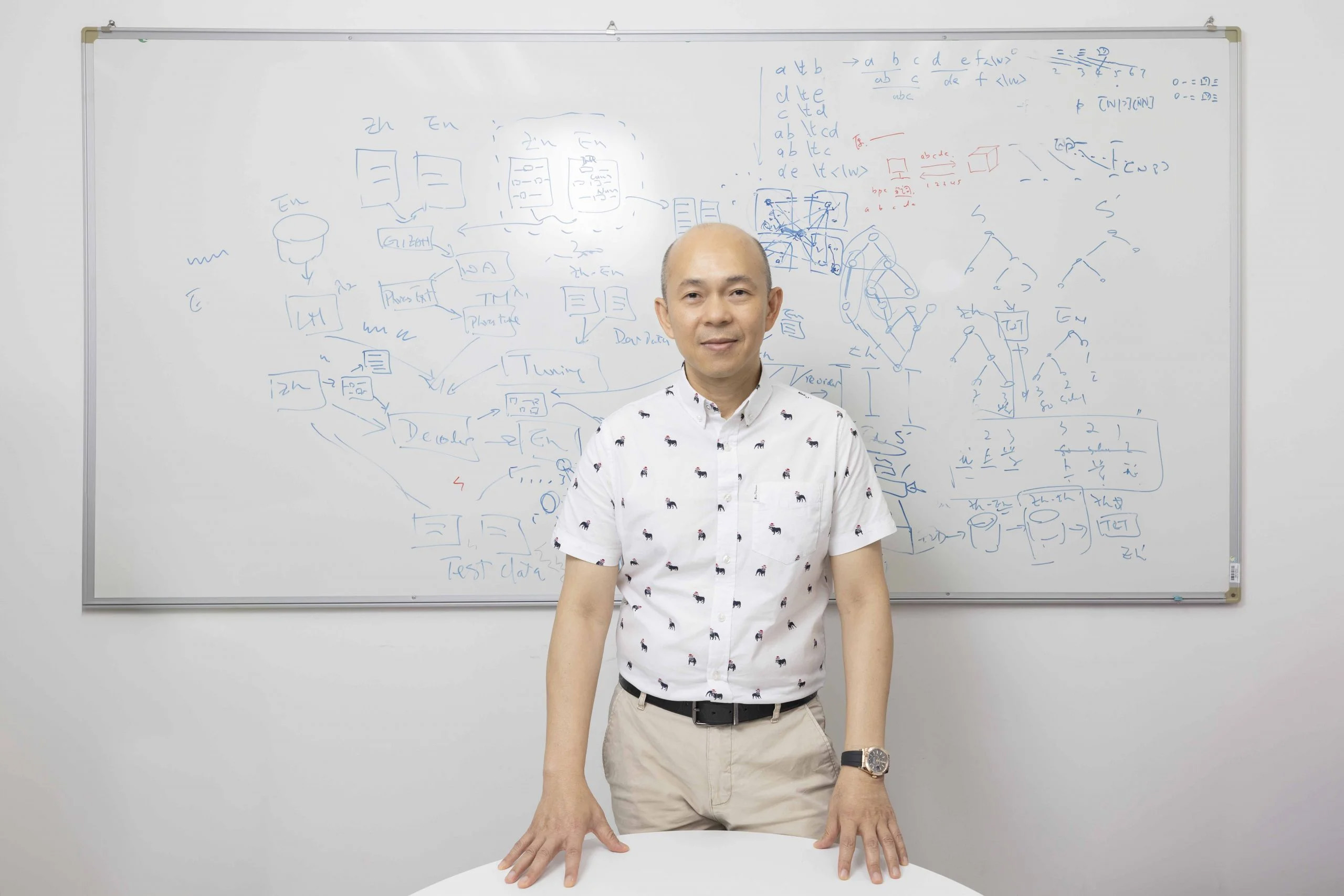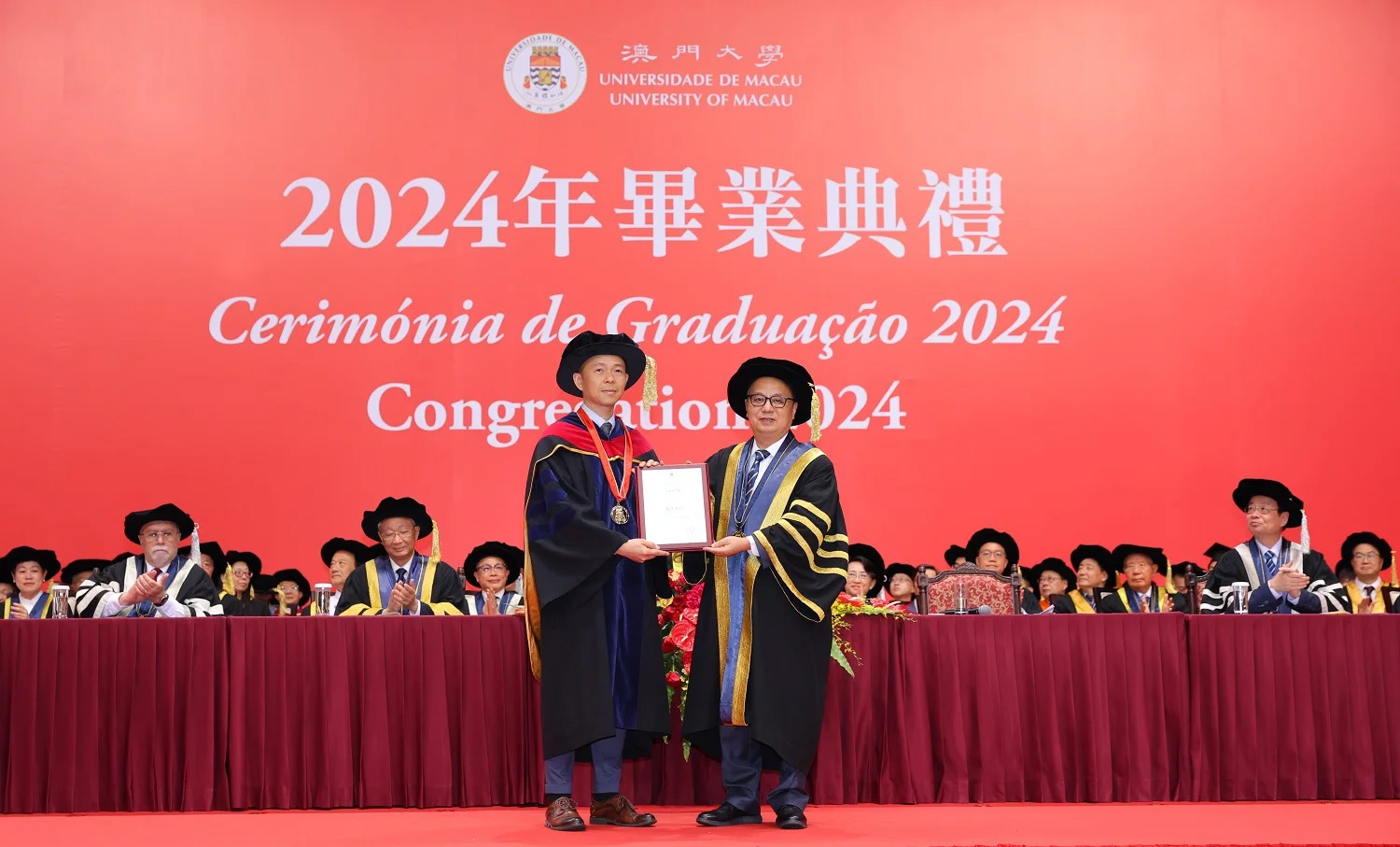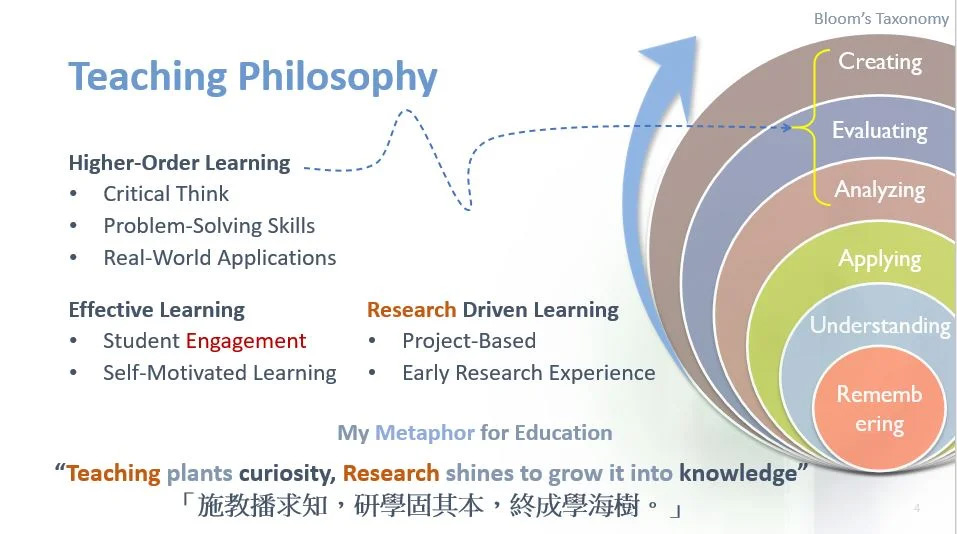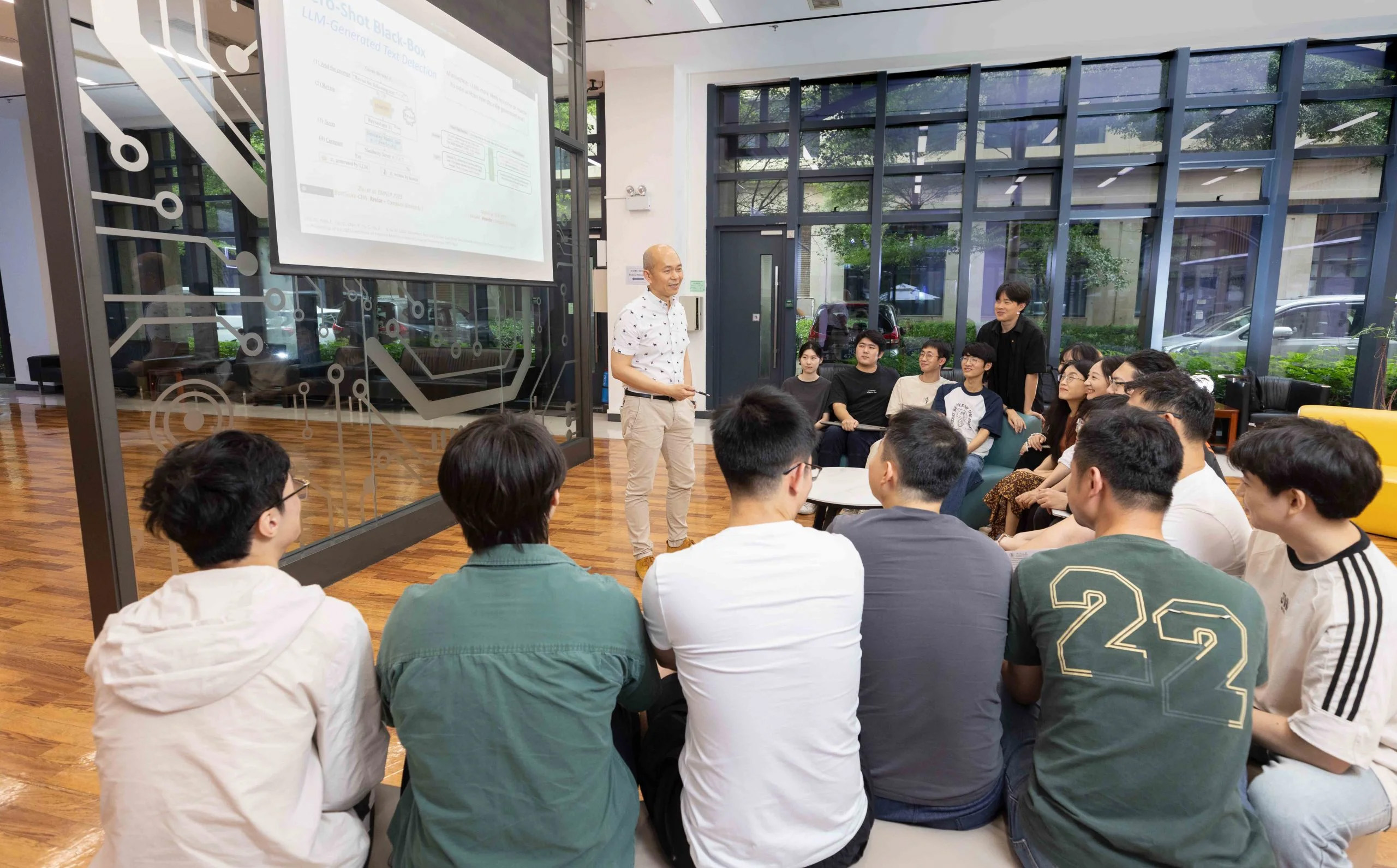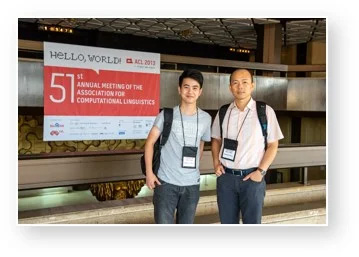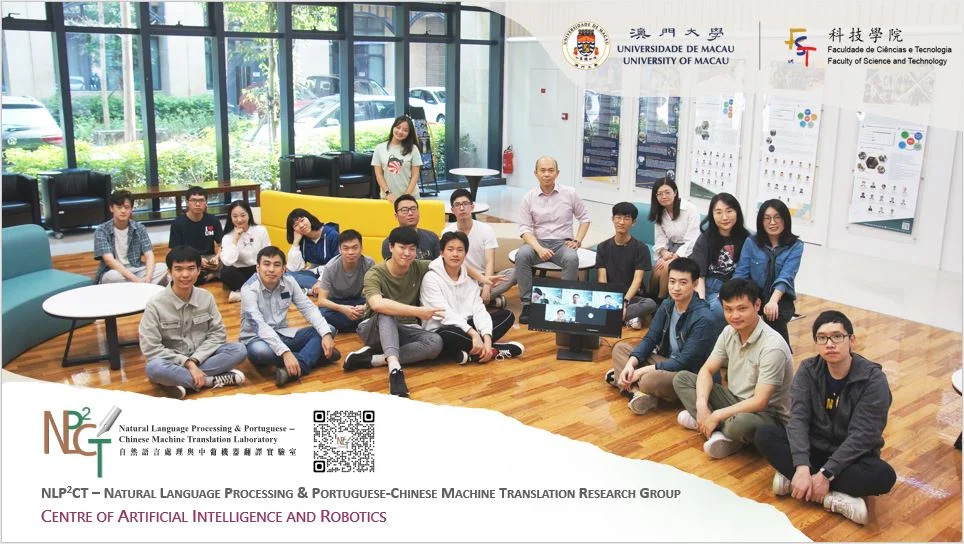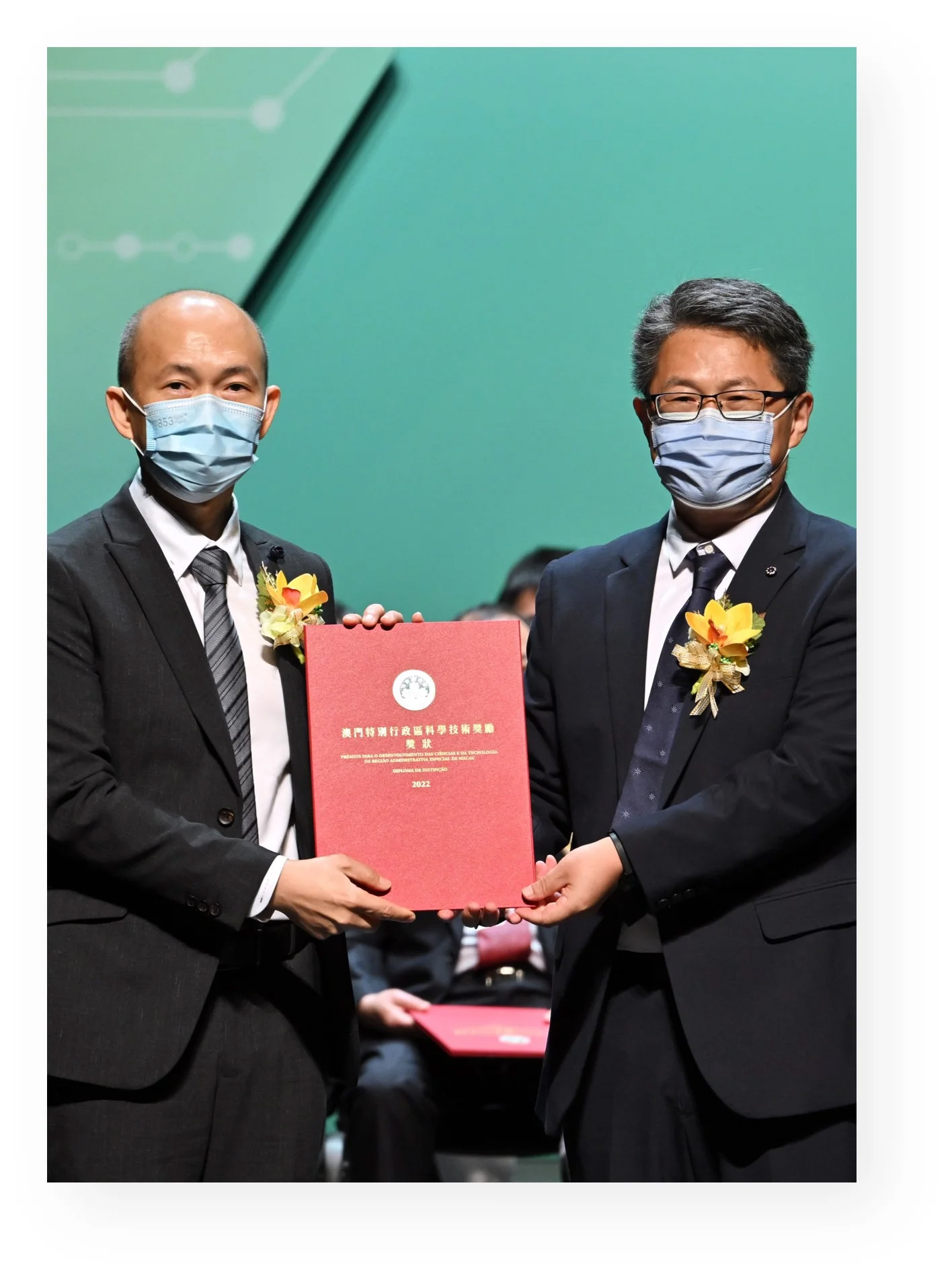‘Don’t think of ChatGPT as something unimaginable. Once you understand how it works, you can develop an AI tool too!’ Wong Fai repeats these words to his students each semester on the first day of class. Prof Wong is an associate professor in the Department of Computer and Information Science of the Faculty of Science and Technology (FST) at the University of Macau (UM). Recognised as a pioneer of machine translation in Macao, Prof Wong’s dedication to innovative teaching earned him the UM Teaching Excellence Award earlier this year. In this article, Prof Wong shares how he guides students to develop creative artificial intelligence (AI) tools and works to expand their career prospects.
Teaching the development of AI tools
The emergence of the ChatGPT chatbot signifies the crucial role of AI in future technologies. Staying at the forefront of AI development, UM has introduced related courses into programmes in fields such as computer science and big data. Among these courses, Prof Wong’s ‘Natural Language Processing’ provides a comprehensive explanation of the operating system of AI chatbots and guides students through the large and complex neural network models behind these AI tools.
At the start of every semester, instead of diving straight into the basics, Prof Wong begins the first class by discussing the practical applications and commercial value of AI tools. One example he gives is the natural language processing technology used in Google Translate and ChatGPT. Prof Wong explains, ‘The reason I start with these examples is to help students understand the connection between the course and current technological trends, as well as AI’s influence on our lives, which in turn, can spark their interest in learning about this field.’
As a pioneer of machine translation in Macao, Prof Wong developed the world’s first Chinese-Portuguese machine translation system before the handover of Macao to China in 1999. In the classroom, he leverages his extensive teaching and research experience to guide students to understand the fundamentals of deep learning in AI and acquire the methods and skills to develop AI models. This includes designing AI tools for specific purposes such as writing poems, translating literary works, smart education, detecting AI-generated texts, and evaluating text quality.
Prof Wong says, ‘Whether it is a machine translation tool or a chatbot, these applications operate based on probability calculations. Once students grasp the deep learning mechanism of AI language systems, they are equipped to develop their own generative AI tools.’
The organic integration of martial arts and AI
Before taking Prof Wong’s course, many students held the belief that developing AI tools on their own was an impossible task. However, Prof Wong’s course has completely changed this perspective, as evidenced by numerous interesting AI projects showcased in FST’s annual final year project exhibition in recent years. One notable example is ‘iTaolu’, developed by FST student Angela Wong. iTaolu means ‘smart taolu’, and taolu refers to the set routines in Chinese martial arts. iTaolu is therefore an AI-based application that generates Nanquan routines (Nanquan is a style of Chinese martial arts that originated in southern China).
Prof Wong says, ‘Angela is a Nanquan champion in the World University Games. After I learned about her background during our discussion about her project, we made the decision to develop an automated system that generates Nanquan routines by using a large language model, and that was iTaolu.’
By analysing Nanquan movements from past international competitions, iTaolu can generate new routines to assist martial arts athletes in their training and competition preparations. Angela expresses her gratitude, saying, ‘Thanks to Prof Wong’s guidance, I was able to integrate Nanquan and AI. He patiently mentored me whenever I faced challenges. iTaolu would not have been possible without his support.’
Prof Wong tailors his teaching methods to suit his students’ abilities, encouraging them to integrate their interests and their research. This teaching approach not only stimulates students’ creativity, but also enables them to apply their knowledge in real-world scenarios, thereby promoting continuous knowledge enhancement and innovation. Prof Wong has created a metaphor to summarise his teaching philosophy: ‘Teaching plants curiosity. Research shines to grow it into knowledge.’
Expanding development prospects for students
Prof Wong is deeply invested in the future prospects and career development of his students. Over the years, he has served as a bridge between the university and industry, facilitating internships for students at leading enterprises such as Huawei, Alibaba, and Tencent. In addition, he provides mentorship for students participating in domestic or international AI competitions. This allows students to gain experience and showcase their research capacity.
Prof Wong says, ‘Most of my students continue their studies in AI or work in technology enterprises after graduation. Our corporate partners are very satisfied with the performance of UM students, with some securing job offers immediately after their internships.’
UM alumnus Samuel Zeng is among Prof Wong’s most outstanding students. During his studies at UM, Samuel established China’s first unstaffed café, Tao Café, which earned him a spot on the list of ‘35 Innovators Under 35 for China’ by MIT Technology Review in 2017. More recently, Samuel founded the AI technology start-up AutoArt and developed the significant AI model ‘ArkModel’. His company is a testament to the cultivation and development of ‘new quality productive forces’ in Xiangzhou, Zhuhai.
Reflecting on his journey, Samuel shares, ‘Prof Wong often arranged visits to enterprises for students, and invited enterprise representatives to speak at the university. These experiences provided us with direct insights into business operations and industry trends, as well as opportunities to forge connections with professionals in the industry. With Prof Wong’s endorsement, I secured an internship at Alibaba during my doctoral studies. This work experience allowed me to translate theoretical knowledge into real-world applications, and address challenges together with team members in the company.’
Samuel is grateful for Prof Wong’s mentorship and support, saying ‘My time at UM has had a profound impact on both my personal and professional development.’
Advancing UM programmes to meet international standards
In 2009, UM initiated a mission to align FST curricula more closely with international standards. To this end, Prof Wong and his colleagues formed a curriculum reform task force to enhance the teaching content and programme structure of the faculty. Their collaborative efforts led to a number of FST programmes receiving accreditation from the Washington Accord in 2014. The recognition by this international accreditation agreement for undergraduate professional engineering academic degrees signifies that UM degrees hold the same professional value as those offered in the signatory countries of the Washington Accord.
Prof Wong explains, ‘Many students may not understand the significance of this accreditation. Essentially, it means that when UM graduates seek employment in any of the signatory countries, their academic qualifications are recognised. They are acknowledged as having met the academic requirements for entry to the practice of engineering. This recognition has significantly broadened their career prospects.’
Today, computer science is a pivotal discipline driving innovation at UM. Due to its high citation frequency, the university’s computer science field ranks among the top one per cent in the Essential Science Indicators (ESI) database. In addition, UM has cultivated numerous AI software engineers and multidisciplinary professionals adept in computer technology applications.
The eternal challenge for educators
Throughout his career, Prof Wong has been a relentless explorer in teaching and research. He not only incorporates cutting-edge technologies like AI into his teaching, but also mentors students in utilising these technologies for innovation. For Prof Wong, the pursuit of educational innovation entails consistent integration of new concepts, methods and technologies into teaching practices in order to enhance effectiveness.
Prof Wong observes that it has become increasingly rare for students to take notes using pen and paper. Therefore, he believes that teaching methods should be continuously innovated. He notes, ‘Not only do we need to adapt to students’ learning habits, but also provide them with personalised instructions according to their individual needs. This is the process of teaching optimisation. Moreover, it represents an eternal challenge for us educators.’
Profile of Prof Wong Fai
Prof Wong Fai is an associate professor in the Department of Computer and Information Science of the Faculty of Science and Technology at the University of Macau. He also leads the university’s Natural Language Processing & Portuguese-Chinese Machine Translation Laboratory (NLP2CT). In 1999, Prof Wong developed the world’s first Chinese-Portuguese electronic dictionary, establishing himself as a pioneer in machine translation research in Macao. He has since developed several machine translation tools, including the ‘Online Chinese-Portuguese-English Computer Aided Translation Platform’, which has significantly facilitated Chinese-Portuguese translation work in Macao.
In 1995, Prof Wong obtained his bachelor’s degree in software engineering from UM. In the same year, he was recommended by the university to study at the Institute of Systems and Computer Engineering in Portugal. He joined UM as a principal investigator in 1996 for a joint research project between UM and Tsinghua University on Chinese-Portuguese machine translation. Prof Wong received his master’s degree in software engineering from UM in 1999, and his PhD in control science and engineering from Tsinghua University in 2005.
Prof Wong specialises in natural language processing, machine translation, computational linguistics, and machine learning. He has published more than 170 academic papers. His contributions have been recognised with the Second Prize in the Science and Technology Progress Award and the Second Prize in the Technological Invention Award of the Macao Science and Technology Award, which he received in 2012 and 2022, respectively.
Source: My UM Issue 135
「別將ChatGPT視為不可思議,只要洞悉其運作原理,你們同樣能開發AI工具!」這是黃輝教授在首堂課的開場白。他是澳門大學電腦及資訊科學系副教授,同時也是澳門機器翻譯的先驅,今年憑借其創新的教學方法獲得了大學的「卓越教學獎」。在本期專訪中,黃教授分享了他如何指導學生根據個人興趣開發創新的AI工具,及如何拓寬學生的職業道路。
傳授開發AI工具的原理
自ChatGPT聊天機器人問世以來,AI已成為未來技術發展的關鍵。目前,澳大的計算機科學、大數據等課程緊跟AI的最新技術發展。黃輝教授所開設的「自然語言處理」課程,全面解析AI聊天機器人的操作系統,引領學生深入探索這一龐大而複雜的神經網絡模型。
每個新學期的第一堂課,黃教授不先講授基礎知識,而是向學生講述AI的實際應用和商業價值,如Google Translate和ChatGPT背後的「自然語言處理」技術。他說:「我希望學生首先理解這門課如何與當今科技發展相銜接,了解AI如何融入我們的生活,從而激發他們對學習的興趣。」
作為澳門機器翻譯領域的開拓者,黃教授曾在澳門回歸前建立全球首個中葡機器翻譯系統。在課堂上,他憑借豐富的教研經驗,循序漸進地引導學生理解AI深度學習的基本原理,並掌握開發和構建AI模型的方法和技巧,例如設計針對特定任務的AI應用工具,如用於詩歌創作、文學翻譯、智能教育、AI生成文本檢測、質量評估等。
他表示:「無論是機器翻譯還是聊天機器人,其運作原理均基於概率統計模型。只要學生掌握了AI語言系統的深度學習原理,便能自行開發出一套AI生成工具。」
武術與AI的有機結合
許多學生原本認為自行開發AI工具是不可能的事,但在修讀黃輝教授的課程後,他們的看法徹底改變。近年的科技學院畢業展中,展出了許多有趣的AI作品,例如學生黃心妍的畢業作品『iTaolu』(智能套路),是一個基於AI的南拳套路生成應用程序。
黃輝教授說:「黃心妍本身是世界大學生運動會武術南拳的冠軍。在討論畢業設計項目時,了解到她的背景後,我們決定開發一個基於大語言模型的南拳套路自動生成系統『iTaolu』。」
iTaolu能夠分析過去國際賽事中出現的南拳動作,生成新的套路戰術,幫助武術運動員訓練和備賽。黃心妍表示:「在黃輝教授的指導下,我將南拳引入AI領域。每當我遇到困難時,他都會耐心指導我,沒有他的指導,iTaolu是無法實現的。」
黃教授鼓勵學生將個人專長或興趣融入研究中,這一因材施教的方法不僅激發學生的創造力,而且有助於其將知識應用於實際情境中,從而不斷促進知識的深化和創新。他的教學理念是:「施教播求知,研學固其本,終成學海樹。」
為學生開拓更廣闊的發展前景
黃教授十分關注學生的畢業出路和職業發展。多年來,他致力於成為企業與大學之間的橋樑,推動學生到華為、阿里巴巴、騰訊等知名企業實習。此外,他還指導學生參加國內外AI學術競賽,積累經驗,並展示他們的科研實力。
黃教授說:「我的學生大多在AI領域深造或進入科技企業。我們的合作企業對澳大學生的表現非常滿意,部分學生甚至在實習結束後被直接聘用。」
校友曾曉東是黃教授的傑出學生之一。在澳大學習期間,他創立了中國首家無人店「淘咖啡」,並在2017年被《麻省理工科技評論》評為中國區35歲以下科技創新青年發明家。如今,他已創立了「ArkModel無界方舟」AI技術初創公司,成為珠海香洲區培育和發展新質生產力的典範。
曾曉東回憶說:「黃輝教授常組織學生參觀企業,並邀請企業代表到校演講,讓我們親身體驗企業運作和行業趨勢,同時建立與業界人士的聯繫。在攻讀博士期間,我在黃教授的推薦下到阿里巴巴實習,將在校學到的理論知識應用於實際工作中,與企業團隊合作解決問題。」
曾曉東深感感激黃教授當年的學術指導和支持:「這些經歷對我的個人成長和職業發展產生了深遠的影響。」
助大學推動課程與世界接軌
2009年,澳大致力於優化科技學院的課程,使其更符合國際標準,黃輝教授與同事們組成了課程改革小組,協助學院教師優化教學內容和課程結構。科技學院的多個課程在2014年通過了《華盛頓協議》的認證,這是一份工程教育本科專業學位互認的協議,意味著澳大的學位具有與簽署國同等的專業價值。
黃輝教授指出:「許多學生未必了解這份協議認證的意義,這代表我們的畢業生在任何簽署國企業求職時,他們的學歷都得到認可,具備進入工程實踐領域的學術條件,從而擁有更寬廣的職業發展前景。」
至今,澳大的計算機科學已成為引領創新的關鍵學科,多次因其引用次數而躋身全球基本科學指標資料庫前1%,培育了眾多AI軟件開發工程師和複合型計算機技術應用人才。
為師者的永恆課題
多年來,黃輝教授在教研路上不斷探索,不僅將AI等前沿技術應用於教學,更引導學生運用這些技術創造新事物。對黃教授來說,不斷將新的理念、方法和技術融入教學,以提升教學效果,是追求教學創新的必經之路。
黃輝教授觀察到,當代學生越來越少使用筆和紙做筆記,因此他認為教學模式應該不斷創新。「我們不僅需要適應學生的學習習慣,還應根據學生的不同需求提供個性化教學,這是教學優化的過程,也是我們作為教師的永恆課題。」
黃輝教授簡介
澳大科技學院電腦及資訊科學系副教授、自然語言處理與中葡機器翻譯實驗室主任。1999年,開發全球首部中葡電子辭典,成為澳門機器翻譯研究的開拓者。其後陸續研發多款機器翻譯工具,包括「在線中葡英輔助翻譯平台」,大力推動澳門中葡翻譯工作。
1995年,黃輝在澳大獲得軟件工程學士學位,隨後被推薦到葡萄牙科研機構INESC深造。1996年加入澳大,並以首席研究員的身份,與清華大學合作開展中葡機器翻譯研究。1999年在澳大獲得軟件工程碩士學位,2005年在清華大學獲得控制科學與工程博士學位。
黃輝教授專長自然語言處理、機器翻譯、計算語言學、機器學習等領域,至今已發表學術論文170多篇。他分別於2012年和2022年獲得澳門科技獎「科技進步獎二等獎」和「技術發明獎二等獎」。
來源:《澳大人》第135期


